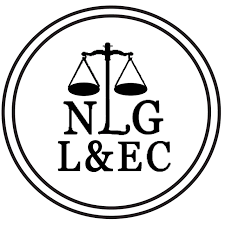-
2024- NLG Annual Conference
Posted in Past Events, Recent Events on Nov 08, 2024
November 2024:
The National Lawyers Guild held its annual conference in Birmingham, AL on Wednesday, October 30 – Sunday, November 3, 2024. Members of the NLG Labor and Employment Committee joined hundreds of other NLG members to discuss how to strengthen the progressive legal community in this moment. We also commemorated the 20th anniversary of TUPOCC, NLG’s United People of Color Caucus, including participation from a founding TUPOCC member who is also a member of our Committee.
-
2024- Activities
Posted in Past Events, Recent Events on Nov 01, 2024
January 2024: Yearly Membership Meeting and presentation from NLRB Member Gwynne Wilcox.
October 2024: In October 2024, the Student Committee organized an information session for law students about summer and post-grad opportunities to work in the labor movement. We were joined by representatives from the Peggy Browning Fund, the AFL-CIO, and SEIU.
November 2024: The National Lawyers Guild held its annual conference in Birmingham, AL on Wednesday, October 30 – Sunday, November 3, 2024. Members of the NLG Labor and Employment Committee joined hundreds of other NLG members to discuss how to stren...
-
2023- Activities
Posted in Past Events, Recent Events on May 19, 2023
February 2, 2023: Building a More Equitable Animal Advocacy Movement: Exploring the Intersections of Labor Rights and Animal Advocacy
May 18, 2023: Overcoming Employer Opposition to Union Organizing: Lawyers and Organizers Strategizing to Win. Participants will explore in an interactive way how the panelists have approached an employer’s challenges to organizing. Panelists included: Emily Maglio, Partner at Leonard Carder, LLP and Eric Hetrick, Business Manager at the International Brotherhood of Electrical Workers Local 2322.
November 29, 2022: Labor is Essential for Democracy: Organizing Amazo...
2022- Activities
Posted in Past Events, Recent Events on Nov 30, 2022
- November 29, 2022: Labor is Essential for Democracy: Organizing Amazon and Starbucks, with Panelists Christian Smalls, Kylah Clay, and Moderator Angela Cornell
- Webinar featuring John Philo & Tony Paris: Worker Adjustment and Retraining Notification Act (WARN Act)
- Cuba Labor Research Delegation
Policy
Engaged in pushing for the “Persuader Rule” with the DOL’s Office of Labor Management Standards
Organizing Support
Starbucks Workers United Support: throughout 2022, Committee members helped with intake for the Starbucks Workers United campaign, assisti...
